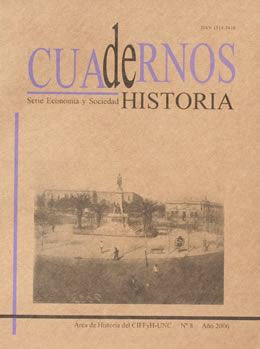Nation, people and democracy: new meanings in the democratic transition. UNIDOS magazine and the project of a democratic Peronism
DOI:
https://doi.org/10.53872/2422.7544.n8.9924Keywords:
peronism, democracy, new identities, national-popular movement, hegemonyAbstract
In this late modernity in which capitalism rests on globalising cultural models that tend to erase national identities, it would be convenient to keep away from the attemps to restore a “national unity” which ignore the contradictions and conflicts that cross Argentina’s history. A critical exercise of memory is undoubtedly healthier to do than an identity reconstruction.
What seems to be important nowadays is to draw attention to “the national issue” by keeping distance from irritated reactions but, at the same time, to consider the challenges which are inherent to the construction of a national project.
As a contribution to this issue, this paper attempts to recover recent series of debates on this topic in our country. The way in which “national issue” is reexamined by the new democratic approach; and the apparent distance between how this issue was analized in the ’60 and ’70, different to that of the democratic transition period.
From the abundant series of discourses of those decades, this paper deals on the production of UNIDOS magazine. It was the editorial experience of a group of intellectuals and politicians of the left of Peronism who wanted to appeal to traditional identity, so that it would comply with the demands of a society that pronounced itself on a deep revaluation of democracy.
In this late modernity in which capitalism rests on globalising cultural models that tend to erase national identities, it would be convenient to keep away from the attemps to restore a “national unity” which ignore the contradictions and conflicts that cross Argentina’s history. A critical exercise of memory is undoubtedly healthier to do than an identity reconstruction.
What seems to be important nowadays is to draw attention to “the national issue” by keeping distance from irritated reactions but, at the same time, to consider the challenges which are inherent to the construction of a national project.
As a contribution to this issue, this paper attempts to recover recent series of debates on this topic in our country. The way in which “national issue” is reexamined by the new democratic approach; and the apparent distance between how this issue was analized in the ’60 and ’70, different to that of the democratic transition period.
From the abundant series of discourses of those decades, this paper deals on the production of UNIDOS magazine. It was the editorial experience of a group of intellectuals and politicians of the left of Peronism who wanted to appeal to traditional identity, so that it would comply with the demands of a society that pronounced itself on a deep revaluation of democracy.
References
Aboy Carlés, Gerardo, 2001, Las dos fronteras de la democracia argentina. La reformulación de las identidades políticas de Alfonsín a Menem, Homo Sapiens, Santa Fe –Argentina.
Aboy Carlés, Gerardo, 2004, “Parque Norte o la doble ruptura alfonsinista”, Novaro, M. y Palermo, V. (comps.), La historia reciente. Argentina en democracia, Edhasa, Buenos Aires, pp. 35-50
Altamirano, Carlos, 2005, Para un programa de historia intelectual y otros ensayos, Siglo XXI, Buenos Aires.
De Ipola, Emilio, 2004, “Veinte años después (Parque Norte: razones del fracaso de un intento inédito de enfrentar la crisis argentina)”, Novaro, M. y Palermo, V. (comps.) La historia reciente. Argentina en democracia, Edhasa, Buenos Aires, pp.51-57.
Martuccelli, Danilo y Svampa, Maristella, 1997, La plaza vacía. Las transformaciones del peronismo, Losada, Buenos Aires.
Palermo, Vicente y Colombo, Ariel, 1985, Participación política y pluralismo en la Argentina contemporánea, BPA, CEAL, Buenos Aires.
Palermo, Vicente, 2005, “Dificultades de las políticas nacionalistas”, Revista Ñ, N° 107, Edición especial Segundo Aniversario.
Patiño, Roxana, Culturas en transición: reforma ideológica, democratización y periodismo cultural en la Argentina de los ochenta, University of Maryland, College Park, Maryland, U.S.A. Fuente:http://www.fflch.usp.br.
Trímboli, Javier, 1998, La izquierda en la Argentina, Manantial, Buenos Aires.
Downloads
Published
Issue
Section
License
Copyright (c) 2014 Cuadernos de historia. Serie Economía y Sociedad

This work is licensed under a Creative Commons Attribution 4.0 International License.
Authors publishing in this journal accept the following terms:
a. The author maintains their copyrights and grants this journal the publication of the first original version of their work that is subject to the Creative Commons Attribution License 4.0. This license agreement allows:
Sharing — copy and redistribution of the published material by any means and formats
Reusing — remix, change, and creation of new material from the published work for any purpose, including commercial use.
b. Authors may enter other non-exclusive license agreements of distribution of the version of the published work (i.e. uploading the material on an institutional virtual archive or republishing it on a monographic volume) as long as they attribute the publication of the original version to this journal.
c. It is allowed and recommended that authors publicize their work on the Internet (i.e. on institutional virtual archives or on their personal or professional websites) after their work has been published in this journal.




